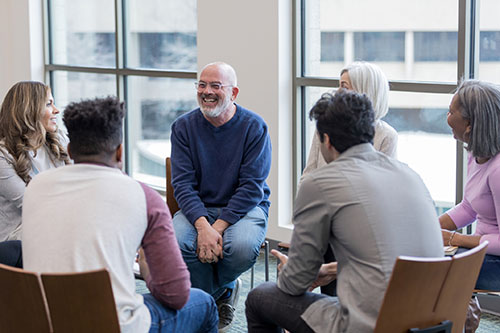
"You don't understand what I'm going through."
"It feels like I'm all alone."
"I just need a little support."
These are just a few of the thoughts that may enter the minds of patients, caregivers, and loved ones after a serious medical diagnosis. Finding out that you or someone you love has an illness can spark a number of reactions from fear to uncertainty to anger — all of which can be overwhelming to overcome.
While it's common to turn to your family and friends for guidance, they may not be equipped with the resources to provide the support you really need.
Support groups have become integral to many hospital systems, including right here in Chester County. The support systems available at Chester County Hospital can offer you a community that truly understands what you're going through.
Here's how support groups can benefit you — and a breakdown of offerings at Chester County Hospital.
A Brief Overview of Support Groups
The essence of a support group is exactly what makes it so powerful — people. Unlike one-on-one counseling, a support group is made up of roughly 5 to 20 participants. They all share a common experience, such as a personal diagnosis or being a caregiver. Or, they may share a specific role, such as being a mother.
Support groups are led by 1 to 2 clinical experts, such as social workers, nurses or nutritionists. In some cases, the support group is led by a former patient alongside a clinician. Because many support groups
target a specific concern, such as living with diabetes or working through the loss of a loved one, that's what the conversation will typically be grounded in.
Common topics of support groups include:
- Coping skills
- Challenges
- Success stories
- General education and clinical updates about a condition
Support group meetings take place on a regular basis, such as every week or once a month. This way, you can build relationships and find the support you need.
From Knowledge-Sharing to a Providing a Hand to Hold: The Many Benefits of Social Support
Whether you've been diagnosed with an illness, are caring for a loved one, or have found yourself in a new life stage, it can be easy to feel alone. And while your friends and family may do everything they can, they may not be able to provide the comfort and encouragement that others in a situation similar to yours can.
For instance, being a caregiver for a loved one can come with effects like physical and emotional exhaustion, many of which significantly impact your life. While a friend can certainly provide a shoulder to cry on, another caregiver who is a member of a support group can share the ways they worked through their own struggles.
Support groups act as a sounding board, where you can listen to others' experiences, talk about your own, and ultimately, recognize that other people understand what you're going through.
Other benefits of support groups include:
- Sharing your feelings and concerns in a judgment-free setting
- Brainstorming ways to tackle a difficult situation
- Sharing tips and strategies
- Benefitting from other people's perspectives — and receiving emotional validation
- Being held accountable for your own growth and awareness
- Building a social support network that may extend beyond the group sessions
- Developing a deeper understanding of your or your loved one's health condition
Plus, at Chester County Hospital, support groups are free of charge and are offered virtually during this time of social distancing.
Keep in mind — the leader of support groups is also a great resource. They can offer expert guidance to the group so everyone is able to get the most out of the experience.
Support Groups at Chester County Hospital
At Chester County Hospital, there are a wide variety of support groups available. Covering topics from illness to nutrition to motherhood, support groups are equipped to support patients as they learn and share about their own or their loved one's health.
Some Chester County Hospital Support Groups include:
- Bereavement Support Group, which educates and guides individuals through the grieving process.
- The Parent Wellness Network, which is focused on keeping parents and parents-to-be healthy and happy.
- Better Breathers Support Group, which helps patients with chronic lung disease.
- Living with Heart Failure Support Group, which helps patients and their loved ones manage chronic heart failure.
- Cardiac Support Group, which is led by a former cardiac patient and facilitated by heart and vascular nurse navigators. The group is open to all cardiac patients and their families.
- Diabetes Support Group, which focuses on the day-to-day challenges of diabetes.
- Parkinson's Disease Support Group, which aims to inform, encourage, and offer fellowship with others coming with Parkinson's disease.
- Gynecology Oncology Support Group, which is a six-week support group for those with a gynecological cancer in active treatment or surveillance. Groups are scheduled throughout the year.
- Implantable Cardioverter Defibrillator (ICD) Support Group, which focuses on living with an ICD and includes discussions and presentations by the electrophysiology team.
For patients who would like to find a support group for drug and alcohol addiction, you can access the local resources for Chester County, PA.
Remember, many of these support groups are geared toward both patients as well as caregivers and loved ones.
Support groups can be invaluable when it comes to coping with illness, supporting a loved one, or taking control of your own health. There is no reason to go through the challenges of life alone — and there's every reason to find the support of others within a support group.
Do you have questions about support groups at Chester County Hospital and how they can benefit you? Call 610-738-2300 or check out our Support Groups and Counseling resources.
Related Information from Chester County Hospital: